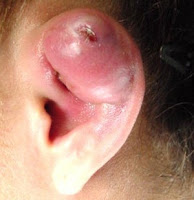It’s not just jewelry that can create health problems. Piercings themselves can also cause different kind of diseases such as Bacteria Infections, HIV Aids and Hepatitis B and C.
Bacterial infection is the main risk associated with body piercings. A build-up of pus (abscess) may form around the piercing site. If left untreated, this may need to be surgically drained and can cause a scar. In some cases, it may develop into blood poisoning (sepsis) or toxic short syndrome, which can be very serious. Blood poisoning can also occur without an abscess.

Tongue piercings carry a small risk of bacterial infection, despite the high number of bacteria inside the mouth. It would be wise to brush your teeth or cleanse your mouth before getting a tongue piercing. The vein under the front of the tongue can also bleed if the piercing is too close to it.

 Ear cartilage piercings (at the top of the
ear) are riskier than earlobe piercings. They can lead to
infection and an abscess developing. This is because the skin is close to
the underlying cartilage and pus can become trapped. Antibiotics don’t
always successfully treat this problem. Surgery can remove the affected
cartilage, but may lead to a deformed ear.
Ear cartilage piercings (at the top of the
ear) are riskier than earlobe piercings. They can lead to
infection and an abscess developing. This is because the skin is close to
the underlying cartilage and pus can become trapped. Antibiotics don’t
always successfully treat this problem. Surgery can remove the affected
cartilage, but may lead to a deformed ear.
Nose piercings are riskier than earlobe piercings, as the inner surface of the nose (which can't be disinfected) holds bacteria that can cause infection.
PREVENTIVE METHOD
You can reduce your risk of developing an infection by keeping your piercing dry. Before touching the piercing, make sure you wash your hands with soap and water, and dry them with a towel. However, try to avoid touching it if possible – there is no need to turn it.
No comments:
Post a Comment